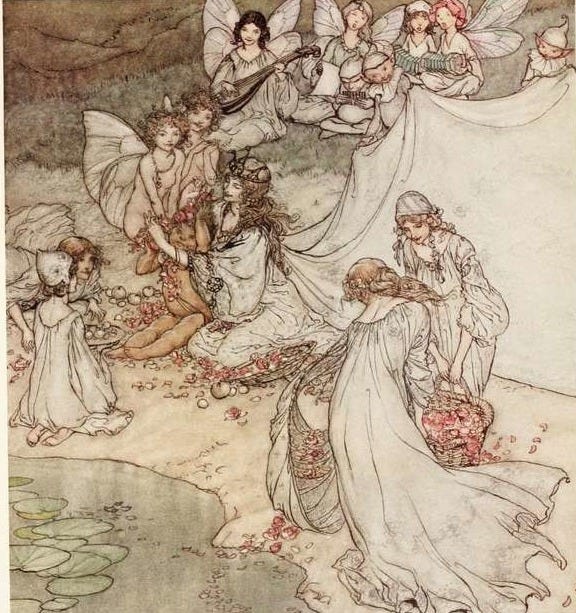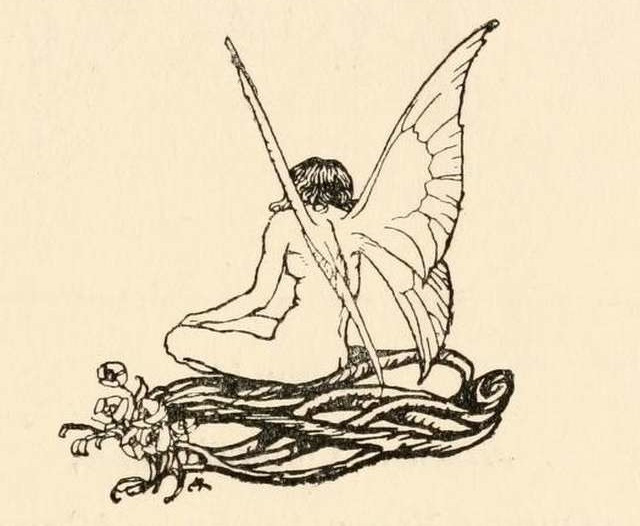At the end of Midsummer Night’s Dream, after the lovers have left the dreamscape of the woods, our characters return to the city and gather together to celebrate the nuptials of the king and queen, and watch the masque of Pyramus and Thisbe.
The king and queen are the first to enter, remarking on the strange tale they’ve just been told, of frolicking fairies and magic love potions.
Hippolyta. ‘Tis strange, my Theseus, that these lovers speak of.
Theseus, the king, is less convinced than his Amazonian bride about the truth of such events, and offers his rationale, a monologue that is a personal favorite of mine, although quite inconsequential to the play itself. It isn’t spoken by any of our main characters. Nor does it matter greatly to the plot. It’s mostly transitional dialogue, some chitchat, to settle us into the fifth act before the action of the masque begins.
For the audience it is both respite from the fairy-realm we’ve just come from, and reorientation back into the ‘real’ world of the city. Night has become day. The shadow play and illusions of the woods have ended, vanished in the sober light of society and city walls. Yet as with Shakespeare, even his filler is substantial, for here he’s given us an exegesis not only on the events of the last few acts, but on the creative mind itself that has figured in our imaginations such events.
Theseus. More strange than true. I never may believe
These antique fables, nor these fairy toys.
Lovers and madmen have such seething brains,
Such shaping fantasies, that apprehend
More than cool reason ever comprehends.
The lunatic, the lover and the poet
Are of imagination all compact.
One sees more devils than vast hell can hold,
That is, the madman. The lover, all as frantic,
Sees Helen's beauty in a brow of Egypt.
The poet's eye, in fine frenzy rolling,
Doth glance from heaven to earth, from earth to heaven;
And as imagination bodies forth
The forms of things unknown, the poet's pen
Turns them to shapes and gives to airy nothing
A local habitation and a name.
Such tricks hath strong imagination,
That if it would but apprehend some joy,
It comprehends some bringer of that joy;
Or in the night, imagining some fear,
How easy is a bush supposed a bear!
Theseus observes how lovers are no different than madmen in the sort of imaginations they possess. It is the kind that “apprehends more than cool reason ever comprehends.” It see things that aren’t there. And both lovers and madmen are like the poet in this respect, for the poet turns those things it imagines into shapes, “and gives to airy nothing a local habitation and a name.”
Theseus, certainly the man “of cool reason,” dismisses the lovers’ tale as the tricks of a mere strong imagination. Lovers, like madmen and poets, have “seething brains.” Yet in his dismissal he has quite elegantly described the poetic process by which the poet figures the imagination.
The poet's eye, in fine frenzy rolling,
Doth glance from heaven to earth, from earth to heaven;
And as imagination bodies forth
The forms of things unknown, the poet's pen
Turns them to shapes and gives to airy nothing
A local habitation and a name.
Paul Ricoeur said that the poet is that artist “who sustains and shapes imagery using no means other than language.” Here we have a glimpse into that poetic process, and from the greatest poet in the English language.
Shakespeare, seemingly at rest for a moment in the progress of his play, takes the opportunity to tell us about his craft. He does so mockingly, by putting it into the mouth of a skeptical Theseus, which is characteristic of Shakespeare. Think of the poet at the beginning of Timon of Athens, who says a poem “slipped idly” from him. “Our poesy is a gum, which oozes / From whence ‘tis nourished.” Or Touchstone in As You Like It who, when asked if poetry is a true thing, replies, “No, truly; for the truest poetry is the most feigning, and lovers are given to poetry, and what they swear in poetry may be said as lovers they do feign.”
For Shakespeare, the lover and the poet share the same romantic sensibility. In Theseus’s speech he says that the lover “Sees Helen’s beauty in a brow of Egypt,” which can refer both to the way the lover sees their own beloved, or, in general, how the lover romanticizes the world, seeing Helen’s beauty in every “brow of Egypt.” The poet and the lover both see things, both “apprehend more than cool reason comprehends.”
Then, of course, there’s Mercutio’s Queen Mab speech, which although it doesn’t mention poets by name, weaves together these motifs of lovers and their strong imagination, for when Romeo, so lovestruck that he feels downright melancholy, says that he can’t be merry, Mercutio replies that the “fairy midwife” Queen Mab must have visited him in his dreams. What follows is pure, fanciful poetry.1 Romeo cuts him off, saying, “Thou talk’st of nothing,” and Mercutio replies,
True, I talk of dreams,
Which are the children of an idle brain,
Begot of nothing but vain fantasy,
Which is as thin of substance as the air
And more inconstant than the wind
Lovers and poets and madmen all have “seething brains.” Shakespeare holds a mirror up not only to the world but to himself as well.
Yet though this be madness, there is method in it. Shakespeare’s fools and madmen often turn out to be the wisest in the play, for they can speak the truth when others cannot. And where would we be without the lovers of the world who see love despite its apparent absence? Likewise, the poet, by shaping and sustaining the imagination, let’s us see what goes on behind ourselves, as it were. They show us what we are, as Shakespeare did better than any other poet, by giving our personalities, our inner lives, “a local habitation and a name.”
Mercutio. O, then, I see Queen Mab hath been with you.
She is the fairies' midwife, and she comes
In shape no bigger than an agate-stone
On the fore-finger of an alderman,
Drawn with a team of little atomies
Athwart men's noses as they lie asleep;
Her wagon-spokes made of long spiders' legs,
The cover of the wings of grasshoppers,
The traces of the smallest spider's web,
The collars of the moonshine's watery beams,
Her whip of cricket's bone, the lash of film,
Her wagoner a small grey-coated gnat,
Not so big as a round little worm
Prick'd from the lazy finger of a maid;
Her chariot is an empty hazel-nut
Made by the joiner squirrel or old grub,
Time out o' mind the fairies' coachmakers.
And in this state she gallops night by night
Through lovers' brains, and then they dream of love;
O'er courtiers' knees, that dream on court'sies straight,
O'er lawyers' fingers, who straight dream on fees,
O'er ladies ' lips, who straight on kisses dream,
Which oft the angry Mab with blisters plagues,
Because their breaths with sweetmeats tainted are:
Sometime she gallops o'er a courtier's nose,
And then dreams he of smelling out a suit;
And sometime comes she with a tithe-pig's tail
Tickling a parson's nose as a' lies asleep,
Then dreams, he of another benefice:
Sometime she driveth o'er a soldier's neck,
And then dreams he of cutting foreign throats,
Of breaches, ambuscadoes, Spanish blades,
Of healths five-fathom deep; and then
Drums in his ear, at which he starts and wakes,
And being thus frighted swears a prayer or two
And sleeps again. This is that very Mab
That plats the manes of horses in the night,
And bakes the elflocks in foul sluttish hairs,
Which once untangled, much misfortune bodes:
This is the hag, when maids lie on their backs,
That presses them and learns them first to bear,
Making them women of good carriage:
This is she—






The poet Malcolm Guite has a brilliant lecture, featured on the Imagination Redeemed podcast, about the Theseus speech and the Gospel of John, connecting imagination and incarnation.
So beautiful